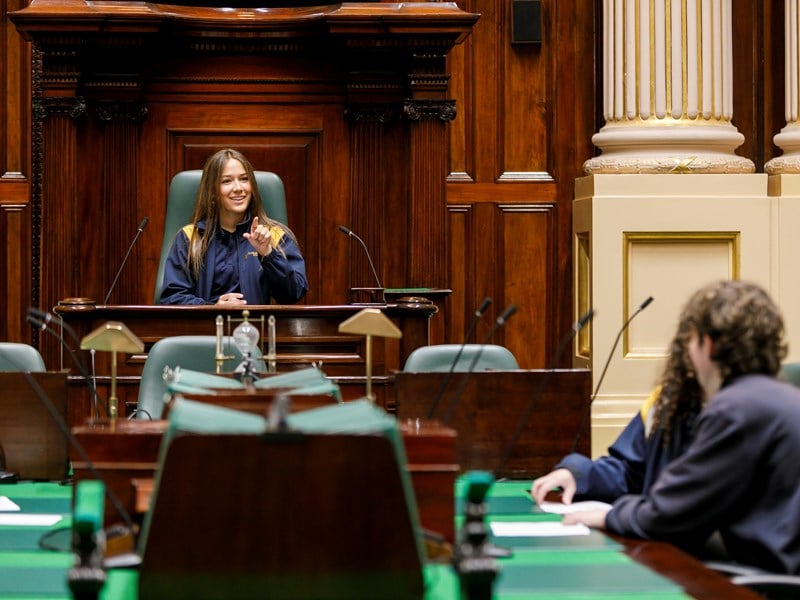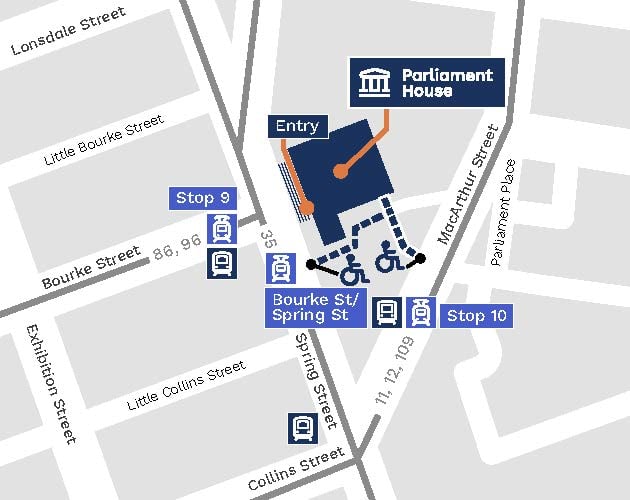- Home /
- Visit /
- For schools
Parliamentary role play

Parliamentary role plays give your students the opportunity to act out the various roles in Parliament to pass a law.
Our interactive activity allows your students to experience the law-making process firsthand by taking on the roles of Speaker, Clerk, Serjeant-at-Arms, Premier, Leader of the Opposition and other members of Parliament. This experience is conducted over 90 minutes and includes a short tour of Parliament House.
Our role play sessions have been designed to align with the Victorian curriculum.
Role play topics for grades 5/6
We have a number of different topics for our role plays that we will ask your students to vote on during your session.
Our Current topics are:
- E-scooters Bill
- Video Game Curfew Bill
- Gambling Advertising Bill.
You can also prepare your own topic with your class by following these instructions:
Role play topics for VCE Legal Studies
We use real bills that have been passed through the Parliament as case studies to show your students how the Parliament makes laws.
At the time of booking, you will be asked to choose one of the following bills:
- Crimes Amendment (Bullying) Bill 2011 (Brodie’s Law)
- Crimes Amendment (Sexual Offences and Other Matters) Bill 2014 (known as the Sexting Bill)*
- Voluntary Assisted Dying Bill 2017*
- Drugs, Poisons and Controlled Substances Amendment (Medically Supervised Injecting Centre) Bill 2017*.
*These bills are examples of law reform coming from a Parliamentary committee inquiry.
Program details
| Cost | Free |
| Year level | 5—6 & 11—12 VCE legal Studies students |
| Group size | 6—30 students per time-slot |
| Duration | 90 minutes (including short tour of Parliament House) |
| Availability | Monday—Friday, 10:00 am & 1:00 pm. Scroll down for available timeslots. |
If your school is located in metropolitan Melbourne
We can visit your school and conduct our role play in your classroom. You can follow the link to our metropolitan Melbourne school visits page for more information.
We also take our role play on the road and visit regional schools
You can follow the link to our regional visits page for more information on the locations we will be visiting in 2025.
Availability and bookings
Bookings open term-by-term – availability is released midway through each term for the next term.
2025 booking release dates:
- Term 3 – 16 June
- Term 4 – 1 September 18 August
Book your role play
Step 1: Check Availability
Explore our current availability for role plays by clicking the button below.
Step 2: Submit Your Booking Request
Bookings are accepted by email request only.
Send your request to tours@parliament.vic.gov.au, including:
| Program name | Role Plays |
| Selected available date(s) | |
| Selected available time(s) | |
| Number of students per session(s) | |
| Year level of students | |
| Role-play topic/bill (VCE Legal Studies students only) | |
| School name and address | |
| Contact number for the booking | |
| Any specific needs or accessibility considerations for your group |
Step 3: Confirmation
Our team will review your request and confirm your booking.
Please remember, this is only a booking request, not a confirmed booking. You will receive a confirmation email once your request is processed.
Enquiries
- Phone: (03) 9651 8572
- Email: tours@parliament.vic.gov.au
Our committment to child safety
For more information on our child safe policy, please click the button below.
